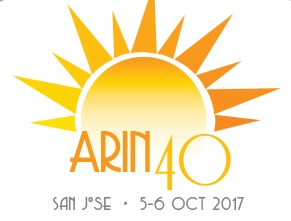 Next week is the ARIN 40 meeting in San Jose, CA. Here is my look ahead at the policies being discussed at the meeting. We will have five draft policies to discuss during the meeting. This time there are no recommended drafts so no policies will be headed to last-call after this meeting. If you aren’t going to be there in person check out the remote participation options.
Next week is the ARIN 40 meeting in San Jose, CA. Here is my look ahead at the policies being discussed at the meeting. We will have five draft policies to discuss during the meeting. This time there are no recommended drafts so no policies will be headed to last-call after this meeting. If you aren’t going to be there in person check out the remote participation options.
2017-3 Update to NPRM 3.6: Annual Whois POC Validation
Policy Summary: This draft policy make changes to the requirements for managing POC (Point of Contact) records in the ARIN database.
Discussion: This policy is intended increase the accuracy of the WHOIS information by removing records and removing ARIN services if records are not updated. This policy was discussed at the last meeting in New Orleans. While this policy so far does not seem to have a lot of support the AC is using this policy draft as a tool to continue the needed discussion around making changes to improve the accuracy of WHOIS records.
2017-4 Remove Reciprocity Requirement for Inter-RIR Transfers
Policy Summary: This draft policy is intended to allow one-way Inter-RIR transfers to the smaller RIRs (AfriNIC & LacNIC).
Discussion: For a while various policies in AfriNIC and LacNIC have proposed one-way policies such that addresses could be transferred into these regions. There is a feeling amongst those in the LacNIC and AfriNIC communities if they allow 2 way transfers, all their IPv4 addresses will just be lost to other regions with more money. This policy was intended to allow those smaller RIRs to obtain additional addresses via transfer from the regions which have older legacy space address holdings.
2017-5 Improved IPv6 Registration Requirements
Policy Summary: This draft policy changes the WHOIS reassignment requirements for IPv6.
Discussion: The current policy for IPv6 WHOIS reassignments requires /64 records to be put into the ARIN database. This does not mirror the current situation with /28’s being required for IPv4. This policy seeks to make a new threshold of /47 or larger OR any block which will be announced separately.
2017-6 Improve Reciprocity Requirement for Inter-RIR Transfers
Policy Summary: This draft policy is intended to block Inter-RIR transfers to RIRs which do not have reciprocal two-way transfer agreements with their NIRs.
Discussion: Some regions (such as APNIC) have NIRs (National Internet Registries) where organizations within that country go to obtain Internet resources. It is suggested that some regions do not have reciprocal needs-based transfer policies between the RIR & NIR, and thus one should prohibit transfers to these RIRs since they do not meet the current ARIN requirements of a “RIRs who agree to the transfer and share reciprocal, compatible, needs-based policies.”
2017-8 Amend the Definition of Community Network
Policy Summary: This draft policy changes the definition of a community network in ARIN policy.
Discussion: The community network policy in the ARIN region has been very rarely used. Since it has been so rarely used we have discussed if it should just be removed from the policy manual or if it should be updated such that more organizations and networks could qualify. This new definition attempts to redefine the policy such that additional organizations can qualify for resources under the community networks policy.

